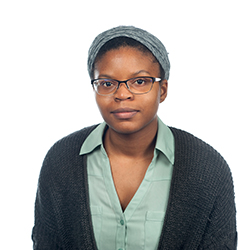February is Black History Month, a special time set aside to celebrate the contributions of African Americans. The College of Sciences joins the celebration by inviting the perspectives of African-American colleagues through a two-part Q&A.
Emily Hokett is a second-year Ph.D. student in the School of Psychology Cognition and Brain Sciences Program. In the Memory and Aging Lab of Audrey Duarte, Hokett is investigating the relationship between habitual sleep patterns and associative memory in young and older adults.
Hokett was born in Dillon, a small town in South Carolina. Everyone in the neighborhood knew each other, and all the children played sports together. Tennis was Hokett’s favorite. Then the family moved to an even smaller town, Mullins, where she finished high school. Psychology grabbed her attention during her senior year.
For most of Hokett’s childhood, she lived with her mother, uncle, and grandmother. “My grandmother was my primary caretaker,” Hokett says. “But as I got older, the roles seemed to reverse.”
Hokett’s grandmother began to lose her memory and slowly forgot the people around her. “It’s devastating to watch someone who raised you forget who you are,” Hokett says. “The difficulty of losing someone so close to me has defined my career choices and academic interests.”
As a freshman at Winthrop University, where she majored in Psychology and Spanish, Hokett began doing psychological research, with Sarah Reiland, an assistant professor of psychology. “We studied the relationship among stressful life events, cognitive flexibility, and depression,” Hokett says. As her research interests grew, Hokett joined the neurobiology lab of Eric Birgbauer, an associate professor of biology. She studied the development of the visual system in an animal model.
At Georgia Tech, Hokett is delving into memory and aging, which have long intrigued her. “My interest stems from a genuine curiosity about the mechanisms and neural correlates of the stages of memory,” she says. The pain she experienced witnessing her grandmother’s memory loss was also a powerful impetus.
What is the accomplishment that you are proudest of so far?
I’m proudest of being able to study in the area of my true interests – sleep, memory, and aging. I’m hoping to continue research in this area throughout my graduate career and likely my entire academic career. I think that lifestyle factors, particularly sleep, have important applications for preserving memory.
What does Black History Month mean to you?
Black History Month is a time to celebrate the contributions of African Americans. Recognizing African-American creativity and strength is important for all African Americans, but especially for young people like me.
As a member of a minority group, I sometimes find it difficult to meet role models who look like me. Black History Month makes finding role models that much less difficult. Instead, I realize that although I may face many challenges as an African American woman, I come from a culture of incredible strength, intelligence, and creativity. Knowing that gives me courage, inspiration, and determination to actively pursue my goals.
For More Information Contact
A. Maureen Rouhi, Ph.D.
Director of Communications
College of Sciences



